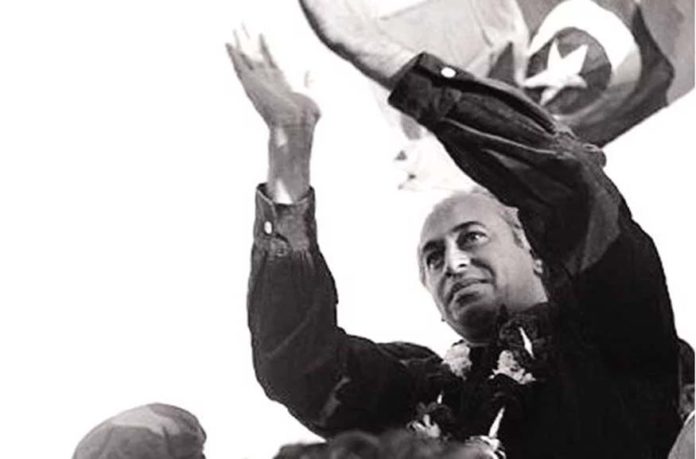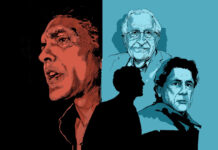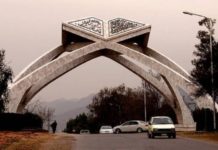Eqbal Ahmad, the renowned scholar, told me an account of his chance meeting in a plane with the then Indian foreign minister (later prime minister), Atal Bihari Vajpayee. Both were on a flight from New York to New Delhi. It was early 1979 and Prime Minister Z. A. Bhutto had been handed over a death sentence by the Punjab High Court.
The appeal in the Supreme Court against the judgement had been rejected. Vajpayee asked Eqbal Ahmad if he thought that Ziaul Haq will actually execute Bhutto. “I don’t think Zia would do so. He may send Bhutto in exile.” Vajpayee paused for a moment, then shook his head and ran a finger over his throat and said, “No Dr Sahib, Muslim rulers do not spare the lives of the vanquished. Bhutto will be hanged.” And hanged he was.
Z.A. Bhutto was not the first, nor the last, head of state of Pakistan that was forced out of office in ignominy. Almost all those who had led Pakistan, with the exception of the founder of the nation Mohammad Ali Jinnah, were arrested, humiliated, assassinated or hanged.
It all started in 1951 when the first prime minister of Pakistan, Nawabzada Liaquat Ali Khan was killed by an assassin’s bullet while he was speaking at a public gathering in Rawalpindi. The putative killer, Sayed Akbar Khan was killed on the spot by the police. With the killing of Akbar Khan not much more could be found – whether he had acted alone or was it a murder planned by others remained unanswered questions.
Next came General Iskander Mirza who ruled from 1956 to 1958. He was toppled in a coup d’etat by General Muhammad Ayub Khan who had a good run for 10 years. The regular dose of humiliation followed and Iskander Mirza was exiled to England.
In the 71 years since becoming a country, we have had 19 civilian prime ministers who ruled for a total of 39 years, at a rather poor average of about two years per head, and five military dictators for 32 years at a much more healthy average of six years per head.
Ayub Khan ruled merrily with an iron fist. Ten years went by quickly and the Field Marshall was safely stuck to the seat of power with velcro. However, soon after the general was done with celebrating the decade of reforms (1958-1968), bottled up popular resentment against him swept him away from power. It took a few fateful months to go from demands to make him a president for life, to slogans calling him a dog. A verse from the poet Yas Yagana Changezi poignantly captures the fate of Ayub Khan: Khudi ka nasha charha, aap mein raha na giya. Khuda beney thay Yagana, magar banaa na giya (intoxicated by your ego, you forgot who you were. Yagana, you tried to play God, but you failed)
Elections took place in 1971 after the ignoble exit of Ayub Khan. Awami League in East Pakistan won the elections and their leader Shaikh Mujeebur Rehman became the designated prime minister of Pakistan. He never saw a day in office as he was declared a traitor by the West Pakistani army and a majority of West Pakistani politicians who were unwilling to accept an Eastern wing political party to rule the country.
Thousands of innocent lives were lost in a brutal repression of the Bengalis carried out by the Pakistan Army and its collaborators. The Two Nation Theory, that had been the basis of the creation of Pakistan, lay in tatters with a new country, Bangladesh – also Muslim majority – appearing on the world map. All this within 24 years of attaining independence from the British.
Z. A. Bhutto became the president and then the prime minister of a truncated Pakistan. A second coup d’etat led by the Army chief General Mohammad Ziaul Haq made short shrift of the elected prime minister in 1977. Subsequently, Bhutto was implicated on trumped up charges for conspiring to murder a political opponent and sentenced to death.
Bhutto’s murderer enjoyed a long reign of power while the people of the country suffered from an equally long wave of terror in which dissenters were thrown in jail, or worse, hanged and tortured. Zia made an unceremonious exit from power when allegedly a case of mango exploded inside the plane. Another dictator bit the dust – this time literally – as the plane crashed in Bahawalpur, killing all aboard.
Elections held in 1988 after Ziaul Haq’s death brought Benazir Bhutto in power. But just in two years she was shunted out by an all-powerful President Ghulam Ishaq and the military which had no love lost for the Bhuttos. This game of musical chairs continued and this time the dice fell in favour of General Ziaul Haq’s protege Nawaz Sharif.
But obviously the seat of the prime minister was jinxed as he became the victim of a third coup d’etat. Nawaz Sharif had wanted to replace the chief of army, General Pervez Musharraf, with a man of his choice and that was against the unwritten law. The prime minister was first imprisoned and then unceremoniously exiled.
Once again it was declared by the men in Khaki and their supporters that Pakistan had been saved from the clutches of greedy sharks and India lovers, known as politicians. Military dictators walk into power easily but are much harder to get rid of.
General Musharraf became civilian Musharraf and ruled with the help of some purchased politicians. But the infamous Ides of March came calling and he badly mishandled a minor show of power by the Supreme Court. This resulted in a series of protests that forced this brave commando to quit amidst slogans that – like the ones raised against his predecessor Ayub Khan.
Once again the nation lined up at the polling stations as it was the turn of a civilian government to mess up the country. Lo and behold this time the curse of power struck even before a prime minister was elected. The leader of the pack Benazir Bhutto was downed by an assassin’s bullet while holding a rally at the same location where Liaquat Ali Khan was killed.
Riding on the wave of sympathy, her party won and 18th Prime Minister Yousaf Raza Gillani was sworn in.
But in the time honoured tradition of Pakistani politics, his chair was kicked out from under him by the Supreme Court for reasons no one remembers today. Nevertheless, a miracle had happened and a government (but not a prime minister) had completed the full five years of their term for the first time in the history of Pakistan!
It was election time again in 2013. Politicians are like the proverbial rope that burns but does not lose its twist and Nawaz Sharif, instead of enjoying his Haleem and Nihari while sitting in his palace in Raiwind, jumped into the fray once again and won it handily.
Now a careful reader would notice an anomaly here in the sequence of power sharing between the khakis and the civvies. Here is how it stood in 2018:
civilian (Liaquat Ali Khan) –military (Ayub Khan) – civilian (Z. A. Bhutto) – military (Zia ul Haq) – civilian (Benazir Bhutto/Nawaz Sharif) – military (Pervez Musharraf) – civilian (Raza Gilani) – civilian (Nawaz Sharif). By some unexplained turn of events, two civilian governments had ruled one after the other! Clearly, such a disastrous state of affairs could not be tolerated by those who were the true defenders of both the boundaries and the faith of the Islamic Republic of Pakistan.
So the boys put their wise heads together and decided that the whole civilian politics is a can of worms, and worms are bad for the health of the country. So they propped up a sportsman who would be wearing khaki under his white cricketing kit. With some clever engineering the sportsman got elected and is now wielding his willow like a twenty-twenty batsman. Unfortunately, he did not practice to bat for many years and is thus hitting the ball everywhere except to the boundary.
And that is where our story stands in November 2018. In summary, in the 71 years since becoming a country, we have had 19 civilian prime ministers who ruled for a total of 39 years, at a rather poor average of about two years per head), and five military dictators for 32 years at a much more healthy average of six years per head. Almost all these great leaders left without a head on their shoulder, or in complete disgrace.
As is the tradition in our sub-continental storytelling, the tale must end with a “moral of the story”. I am not an admirer of Imran Khan and his band of mindless followers but since I have told this story, I am duty bound to provide the proper ending for the benefit of the current government. So here it goes:
“Muslim kings do not spare the vanquished. And you know who is the real King in this country! Tread carefully and watch your back. It takes very little to go from hero to zero with the concomitant consequences – for the head, no less.”
Written by Vaqar Ahmed. Originally published here.








I am a great admirer of Imran khan . His followers are very loyal and have great insight. Time will prove.
If a person writes god english it does not mean that he can analyse well.